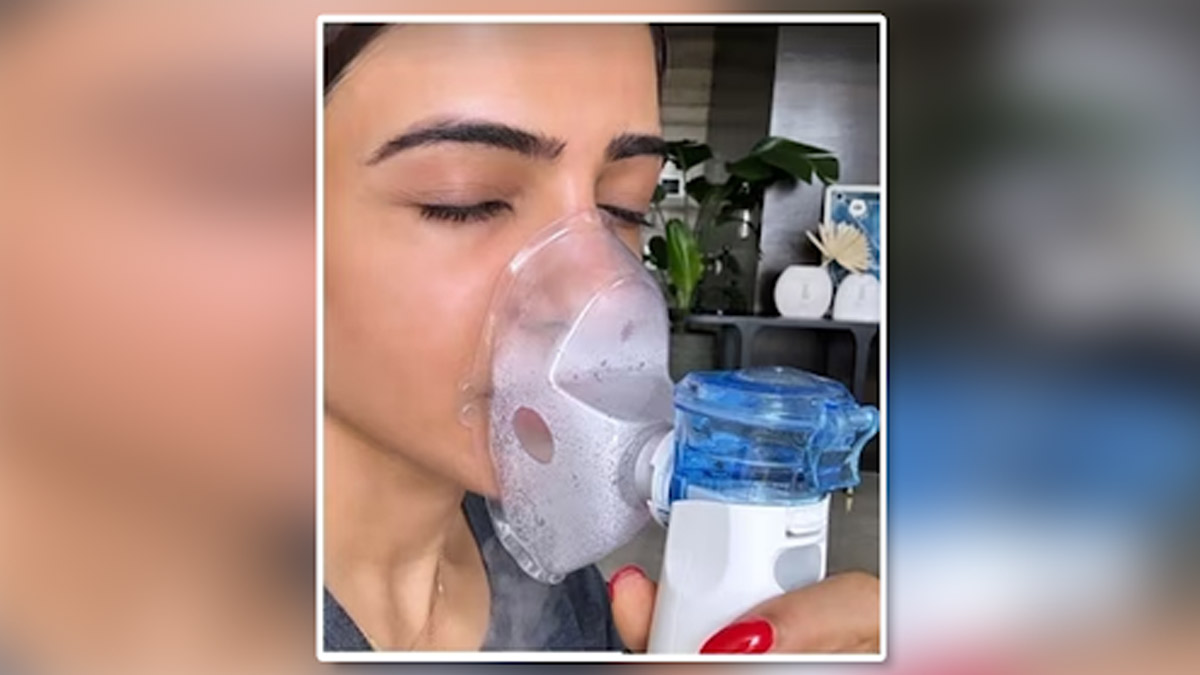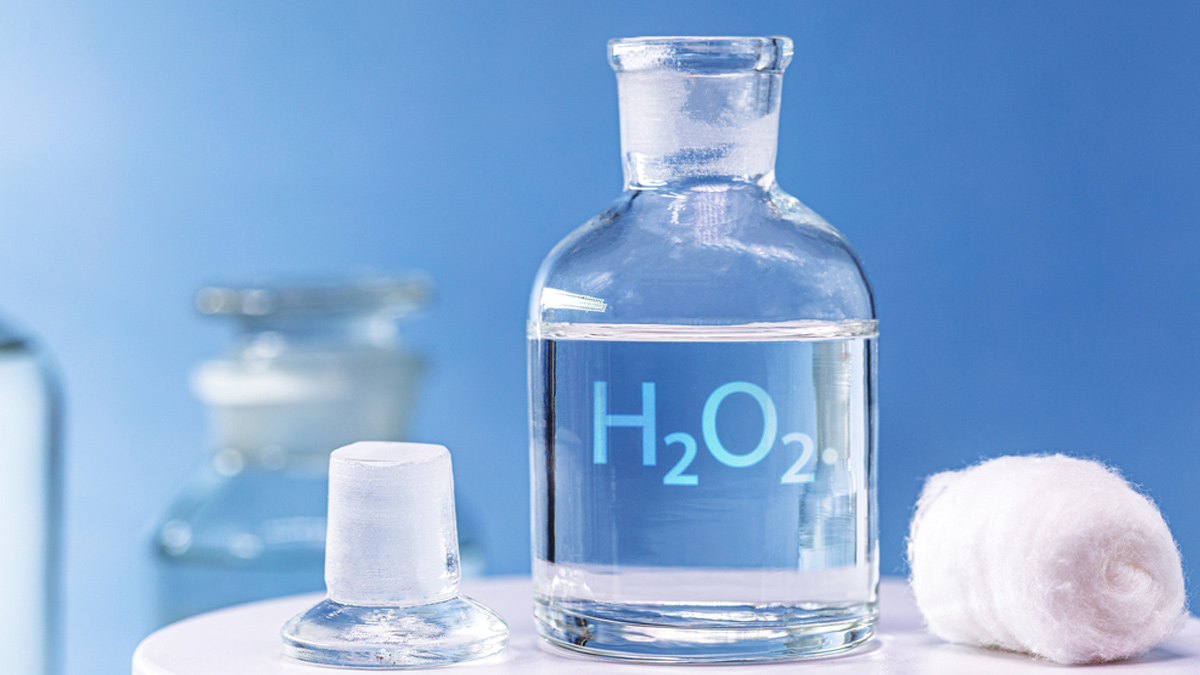
Actor Samantha Ruth Prabhu recently shared a photo on Instagram recommending hydrogen peroxide nebulization as a treatment for viral infections. This caught the attention of Dr. Cyriac Abby Philips, also known as "The Liver Doc" on social media, who criticised the recommendation. He called the actress "health and science illiterate" and warned that hydrogen peroxide nebulization is harmful.
Table of Content:-
Dr. Philips highlighted a warning from the Asthma and Allergy Foundation of America, which states, "Do not put hydrogen peroxide into your nebulizer and breathe it in. This is dangerous. It is not a way to prevent or treat COVID-19." Samantha had written in her post, "Before taking medication for a common viral, consider trying an alternative approach. One option is to nebulize with a mixture of hydrogen peroxide and distilled water. Works like magic. Avoid unnecessary use of pills."
To know the adverse effects of hydrogen peroxide nebulisation, OnlyMyHealth spoke to Dr Swapnil Mehta, Pulmonologist, Dr LH Hiranandani Hospital, Powai, Mumbai. We also interacted with Dr Roohi Pirzada, General Physician, Mumbai.
Warning against the use of hydrogen peroxide, Dr Mehta said, “As a pulmonologist, I strongly advise against nebulizing hydrogen peroxide for any viral infection. Although people might be tempted to try these methods due to their efficiency, it can bring fatal effects to your lungs.”

“Hydrogen peroxide (H₂O₂) is a strong oxidising agent commonly used for its disinfectant properties. However, its use in nebulisation, a process where liquid is turned into a fine mist for inhalation, poses significant health risks,” Dr Roohi Pirzada said. Here's why hydrogen peroxide is harmful for your health:
Designed to Clean, Not Breathe
“Regular hydrogen peroxide you buy in the store is a disinfectant; it is designed to eliminate germs on the surface of objects. Its concentration and properties are much too strong for such delicate lining of the respiratory tract,” Dr Mehta said, adding, he said, “Its inhalation has instant effects such as irritation, inflammation, and coughing. In its worst-case scenarios, it can progress to pulmonary edema, a condition characterised by fluid accumulation in the lungs, which is a genuine medical emergency.”
Also read: What Is A Nebulizer, Know When and Why It Is Used
Mucosal Irritation and Oxidative Stress
Hydrogen peroxide can cause severe irritation to the mucosal linings of the respiratory tract. When inhaled, it generates oxidative stress, leading to cellular damage.

Acute Lung Injury (ALI)
Dr Roohi said, “Acute lung injury is a serious condition that can arise from inhaling harmful substances like hydrogen peroxide. ALI involves widespread inflammation and damage in the lungs, severely impairing respiratory function.”
Disrupting the Body's Defence
“Our own lungs generate low levels of hydrogen peroxide to kill bacteria. Nebulized hydrogen peroxide disrupts this balance thereby putting at risk the healthy lung tissue,” Dr Roohi said.
No Scientific Backing
As per Dr Mehta currently, there is no proof derived from scientific research that hydrogen peroxide nebulisation is effective in treating viral diseases, including COVID-19. “In fact, large medical organisations such as the FDA have not recommended it for any respiratory disorders at all. In other words, it is simply not built for this kind of use,” Dr Mehta said.
Cytotoxicity to Respiratory Cells
Dr Roohi explained, “H₂O₂ is cytotoxic, meaning it can kill cells. Inhaling hydrogen peroxide can lead to cellular damage and death within the respiratory system, particularly affecting the delicate cells lining the lungs.”
Risk of Chemical Burns
Dr Roohi said, “The oxidative nature of hydrogen peroxide can cause chemical burns to the respiratory tract cells. These burns can be severe and potentially irreversible, leading to long-term damage.” Adding to this, Dr Mehta, “Ingestion of concentrated hydrogen peroxide can lead to severe inflammation of the mucous membranes in the eye, nose, or throat. It is dangerous to nebulize it as this exposes the sensitive areas accidentally throughout the treatment process.”
Also read: Lung Disease: Know How Nebulizers Lead The Way To Manage Respiratory Diseases At Home

Increased Risk of Infection
“Nebulizers need to be cleaned and disinfected regularly to guard against bacterial infiltration. Inhalation of hazardous germs through the use of a nebulizer with hydrogen peroxide can exacerbate the original disease instead of improving it,” Both the doctors agreed.
Safer Alternatives Exist
Dr Mehta recommended, “For respiratory ailments, there are ways of managing the diseases based on the type of virus that is causing it. It is recommended to visit a doctor and get an accurate diagnosis and an effective treatment plan for the problem.”
Conclusion
Sprayed hydrogen peroxide has the ability to kill viruses but it actually poses serious health hazards to the body. It is important to get the medical help of a professional if you or someone close to you shows signs of any respiratory problems. A doctor will be in a position to advise on a safe and effective course of treatment that will assist an individuals’ fast recovery.
Also watch this video
How we keep this article up to date:
We work with experts and keep a close eye on the latest in health and wellness. Whenever there is a new research or helpful information, we update our articles with accurate and useful advice.
Current Version
